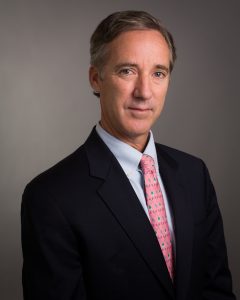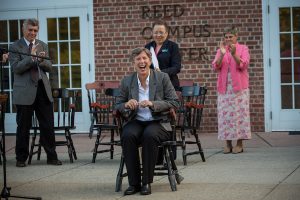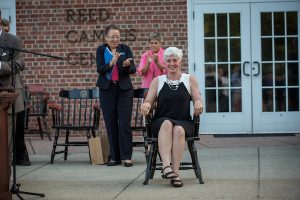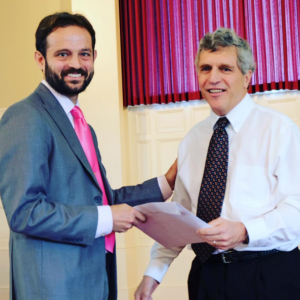Headmaster Hill, faculty, students and cum laude inductees, thank you for inviting me to speak today.
I want the 11 cum laude inductees to stand. Let’s give them a round of applause for their attainment of the highest academic achievement in secondary school. You had focus, drive, diligence and just plain old hard work. I’ve stood where you stand and it’s like getting an academic Superbowl ring. Congratulations!
Now I want the inductees to remain standing. Turn around and give everyone else in this room a round of applause for being there for you as mentors, educators, supporters, friends, competitors, listeners, dorm-mates and teammates. Because no matter how good you are, and how bright you are and how hard you work, you didn’t get to this point without the rest of them. Congratulations to everyone else in the room.
There isn’t a person in this room who isn’t expected to leave here and go on to college and succeed. Your teachers expect it, your parents expect it, you expect it. A great secondary school education like Williston-Northampton puts you on the road to a good college, a good grad school, a good job and a good life. It’s the first step down the road to living the dream.
However, I want to quote the following sobering statistics from the Centers for Disease Control and the 2015 National College Health Assessment Survey:
- More than 50% of college students feel over-whelming anxiety
- 30% feel depression at some point
- 1 out of every 12 college students at some point makes a suicide plan.
- Two thirds of those students never reach out for help and about 1500 college students per year will complete their suicide.
- Suicide is the second leading cause of death in 5-24 year olds in the US and suicide along with alcohol and drugs is the leading cause of death for young white adults.
Now the good news is that 11 out of 12 college students never make a suicide plan and 20.3 million college students keep on going. The stress is there and the anxiety is there for all of them. so how do we help you stay in that 11 out of 12? It comes in knowing what are the stressors that everyone who has been there has faced and how do you get beyond it?
This is what we know about the stressors:
- Much like independent school: you’re away from home, you’re homesick, schedules and workloads are different, roommates and relationships are new. It’s difficult to know how you belong to this new environment. Luckily for anyone who is a boarding student, you’ve already experienced some of this.
- College cost: The cost of a college education is over the top. Even when your parents think they’ve saved, it’s often not enough. Financial pressures often create anxiety about whether you can afford to finish, or you have to take time off to make money or you have to switch to a less expensive school.
- Competitiveness: This is a biggie. College is not high school. But schools like Williston can prepare you for open ended assignments and independent thinking, how to focus on success and how to recognize and learn from the importance of failure, how to recognize that maybe you’re not alone in finding new information difficult.
- Difficult acceptance rates: The more competitive the school…the more competitive the student body. As they told my freshman class at Dartmouth: “you all came from the tops of your class. Now at Dartmouth, someone has be at the bottom of the pile”. And competitive students not only push up the mean but competitive students are not always nice people. As a pre-med, I’ve encountered this one first hand.
- Campus crime: If you don’t live or work in a safe environment it’s difficult to feel comfortable – to work late, or reach out to strangers.
- The prospect of a good job, or any job for that matter. If I don’t get an A in organic chemistry, I don’t get into med school. If I don’t get into med school then I don’t become a doctor. If I don’t become a doctor then my life s over because it’s the only thing I’ve ever wanted to be. And…my parents will be disappointed in me. And then what am I going to do?
So if those are the stressors, what are the consequences of all this stress and anxiety producing stuff?
More stress and anxiety. Sometimes depression. Or worse. We focus more and more on our success but don’t know how to fail. Instead of thinking I failed at something (1 test, 1 paper) some students begin to think “I am a failure”. We become good at rattling off our accomplishments but don’t know what it is that we really want out of life or what really makes us happy. We try to be good at everything, but not necessarily passionate about anything. And worst of all, we allow social media to define us. The Social Comparison Theory says that we try to determine our own worth by how we compare to others. Snapchat and Facebook promotes the myth that everyone else’s friends are more in number, prettier, happier and having more fun. Some of you may have experienced that now in prep school, before you’ve even gotten to college.
The antidote: Resiliency, Well-being and Positive emotions. sounds hokey – I know. But listen.
Resiliency is like Gumby (everyone know Gumby – the little green guy?) The ability to cope with stress and adversity and bounce back. That’s resiliency.
Positive emotions are micro-moments that are contagious, that build bonds and foster compassion, empathy and trust. Positive emotions allow you to focus on your strengths – building what’s right with you – instead of just to just trying to fix what’s wrong. It allows you to turn your inner critic into your inner coach and keep you from wallowing in catastrophe – oh woe is me… Positive emotions and resiliency allow you to take stress and use it like a set of weights in a work-out, adapting your cortisol levels, getting feedback, building strength so that you can handle a higher weight workout – the next more stressful thing that happens.
OK, so I’m going to give you 6 resilient and positive emotion things to help you not only deal with the stress of college, but also the stress of job, relationships, life.
- Know yourself: understand your strengths. By being humble you can accept your shortcomings. Know your weaknesses and your motivations. what makes you feel good about yourself . Recognize that you’re a leader – even when you don’t think so – because you have the ability to influence someone else in a positive way.
- Love yourself: be compassionate to yourself, take time to quietly reflect, take time to play, take time to laugh, exercise, play sports, eat well and sleep well.
- Focus yourself: be present. Enjoy each moment that you’re in and the people you’re with. And if you don’t like them – walk away. It’s not worth the energy. Sometimes you have to avoid multi-tasking and focus on only one thing. Most of all, find time to unplug – just don’t use the unplugged world as a retreat from reality.
- Find meaning in yourself: develop your values, recognize your talents, set realistic goals and challenges, say your gratitude’s daily (it’s a mindfulness exercise: thank you for my dog for loving me unconditionally, thank you to Headmaster Hill for being such a good person, thank you for my roommate who doesn’t snore..) Any thank you can give meaning to your life.
- Grow yourself: learn from your challenges – they are opportunities to move you forward, learn from others and borrow some of their strength, actively problem solve for yourself – don’t ask someone to do it for you.
- Finally – Share yourself: Social and hard science now shows us that social connections and face-2-face interactions are what make people live longer and happier lives. Reach out to other students, teachers, professors, staff. Get off the phone and the internet. Smile. Volunteer. Tutor. Join a club. Join a team. Perform random acts of kindness.
This last one—share yourself—is probably the most underrated and yet one of the most important. It makes you feel good about yourself, and you never know how you’ve impacted someone else who may have needed you. This past summer, 50 years after being in elementary school I received a card in the mail. It was from an elementary school classmate who I haven’t seen since I left home for Williston. The person said that a close friend of theirs had died and they were on a quest to track down and write to people who had an impact on their life. This person wrote “You might not realize how much your friendship and kindness meant to me, There were several cruel children in our class who sought to demean those who did not ‘fit.’ I remember walking with you to music lessons, just laughing and having fun. Thank you!.”
I hope and believe that I’ve carried that trait though my time here at Williston-Northampton, in college and medical school, through residency and fellowship, through my 7 months on a ship in the Persian Gulf, through marriage and family life, through clinical interactions with my patients and as a medical director with other physicians, nurses and staff. I, too, have suffered through my share of anxiety and depression and stress, because that’s not just what high school and college throws at you but what life throws at you every day.
I’ve learned to say my gratitudes all the time, and one of the biggest is to say thank you to Williston-Northampton. In 1975 the world was my oyster. Everyone in this room has that same open book in front of you and I wish for you with hard work, resilience and positive emotions that you achieve your success and your dreams.


 It’s only once a year that I get to stand before all students and many sets of parents or guardians, aunts and uncles—and now I am doing it for my eighth time as headmaster. And since that’s the case I am going to seize the opportunity to brag on you, to brag about students, and faculty as you head into the heart of Family Weekend and all that is going on. Williston’s community is remarkable and I’ve seen that in myriad ways for the past seven years. Here’s a very very public example of what I mean. Last night, I attended the play Our Town. I’ve come to expect great plays at Williston—Ms. Ditkovski has developed a gold medal program—and once again the cast was unbelievable in their display of talent and range.
It’s only once a year that I get to stand before all students and many sets of parents or guardians, aunts and uncles—and now I am doing it for my eighth time as headmaster. And since that’s the case I am going to seize the opportunity to brag on you, to brag about students, and faculty as you head into the heart of Family Weekend and all that is going on. Williston’s community is remarkable and I’ve seen that in myriad ways for the past seven years. Here’s a very very public example of what I mean. Last night, I attended the play Our Town. I’ve come to expect great plays at Williston—Ms. Ditkovski has developed a gold medal program—and once again the cast was unbelievable in their display of talent and range. 

 Ed. note, the Sandra Bashore ’55 and Joseph C. Mesics Instructorship was awarded to Math Department Chair Joshua Seamon during an all-school assembly on September 15, 2017. Dean of Faculty delivered the following remarks.
Ed. note, the Sandra Bashore ’55 and Joseph C. Mesics Instructorship was awarded to Math Department Chair Joshua Seamon during an all-school assembly on September 15, 2017. Dean of Faculty delivered the following remarks.